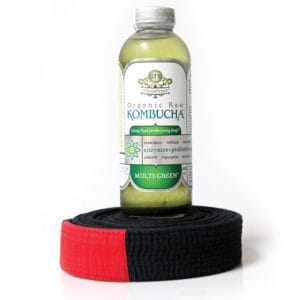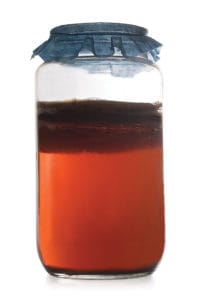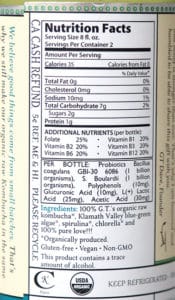Kombucha The Black Belt of Teas

If you don’t live under a rock, chances are you’ve heard of kombucha. (Especially if you’re known to hang out in jiu-jitsu gyms.) Although the fermented tea has been around for thousands of years, it has recently made a splash in the health, fitness, and natural food industries. Kombucha dominates the North American functional beverage market. It has been reported that Americans spent almost $400 million on kombucha in 2014, and that amount is growing quickly. Fans of kombucha praise its alleged health and healing properties. But is kombucha really all that? Whether you’re new to the trend or a committed consumer, here is everything you need to know about kombucha and how it might impact your jiu-jitsu.
How It’s Made
Kombucha can be made at home, but even if you’re not a home-brewer, it is important to understand the relatively easy process.

Glass jar containing Kombucha Tea, a healthy drink of China original.
Kombucha is essentially sweetened black or green tea that has been fermented with a SCOBY, which stands for symbiotic culture of bacteria and yeast. The SCOBY, sometimes referred to as the “mother” or “mushroom”, feeds off the sugar, caffeine, and acids in the tea. The process results in a bubbly, fermented drink packed with microorganisms. Plain kombucha usually has a slightly sour taste, but the flavor of kombucha can also be altered with juices and spices.
Digestion
Kombucha is great for your gut. Since good gut health is important in every aspect of your well-being, including your performance on the mat, this should be a key reason why you might want to give it a try. Because the fermented beverage is full of good bacteria, acids, and probiotics, kombucha has been proven to aid in digestion. The bacteria and probiotics in the drink also help to ward off harmful yeast, or candida. If your digestive system needs a healthy balance, kombucha might be the cure. As with any carbonated drink, however, kombucha can cause bloating in some people. Although it is healthy to drink everyday, to avoid bloating, don’t consume kombucha in excess.
Detoxification
and Immunity
The antioxidants in kombucha help to detoxify your liver. The probiotics and vitamins in kombucha can also give your immune system a healthy boost. Kombucha can be used to flush your system of pollutants and bad bacteria. Although they haven’t been verified, some studies show that the acid in kombucha can actually help in cancer prevention, and that the properties of green tea may reduce the risk of heart disease.
Weight Loss
Some consumers claim that kombucha helps with weight loss. Although this claim has not been proven, evidence does suggest that kombucha might increase the metabolic rate. More importantly, kombucha can help weight loss because its natural carbonation means that it is a great healthy alternative to sugary sodas or energy drinks. Kombucha also contains glucosamine, which is an amino sugar that is commonly used to improve joint function. Therefore kombucha might be beneficial to us grapplers who put pressure on our joints while training. Furthermore, kombucha also contains iron, which can increase energy levels, and increased energy is great for anyone – especially if you’re trying to lose weight or just want to keep training.
Alcohol
Because the fermentation process breaks down sugars into alcohols, kombucha does contain alcohol. In fact, in 2010, retail stores recalled kombucha due to elevated alcohol levels. Food inspectors found that some bottles had over 2.5% alcohol. Since then, kombucha brands have better regulated their products, and the alcohol content usually hovers around 0.5%. For some kombucha drinkers, this amount of alcohol is negligible; however, if you are especially sensitive to alcohol, kombucha might not be healthy for you. Additionally, some studies show that pregnant women should stay away from kombucha due to its alcohol content.
Caffeine
Black and green tea both contain caffeine, and although the SCOBY processes most of the caffeine during fermentation, the resulting kombucha still contains trace amounts. Although it differs by brand, kombucha usually contains about one third of the

tea’s original caffeine content. The caffeine content of kombucha will not affect most people. However, if you’re avoiding caffeine (among other health and medical issues, caffeine has been linked to anxiety and insomnia), you might want to limit your kombucha intake, or choose a green tea kombucha. Green tea has significantly lower caffeine content than black tea.
Sugar
Plain kombucha usually has low levels of sugar. Even though the fermentation process requires sugar, the SCOBY eats most of it before the kombucha is ready for you to consume. As a result, the unflavored health drink usually has between two and six grams of sugar per eight ounces. However, this number can be drastically altered with flavored kombucha. If you’re diabetic or watching your sugar intake, stick to plain kombucha. Flavored kombucha with added juice packs a ton of hidden sugars. Always check the nutrition label to ensure you’re making the healthiest choice.
Whether or not you’ve decided to adopt kombucha into your daily diet, the fermented drink is here to stay, especially around the jiu-jitsu scene. By 2020, the global market value of kombucha will have reached an estimated 1.8 billion USD. It is an acquired taste, but many people, myself included, really enjoy the flavor. If you want to add a functional drink to your supplementation regimen that’s inline with the jiu-jitsu lifestyle, then definitely give kombucha a try.

